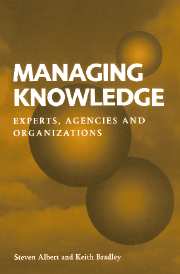Book contents
- Frontmatter
- Contents
- List of figures
- List of tables
- Introduction: the supply-side in context
- Part 1 Expert employees and their new organization
- Part 2 The labour market and the expert employee
- 7 AT&T's special employment policies for expert employees
- 8 An external temporary agency and expert employees
- 9 The Hollywood agency system
- 10 The Internet as an agent
- 11 Labour market segments re-examined
- 12 Agents and intellectual capital
- Appendix A Formal exposition of Winston model
- Appendix B Agency employment and search costs
- Notes
- References
- Index
11 - Labour market segments re-examined
Published online by Cambridge University Press: 23 November 2009
- Frontmatter
- Contents
- List of figures
- List of tables
- Introduction: the supply-side in context
- Part 1 Expert employees and their new organization
- Part 2 The labour market and the expert employee
- 7 AT&T's special employment policies for expert employees
- 8 An external temporary agency and expert employees
- 9 The Hollywood agency system
- 10 The Internet as an agent
- 11 Labour market segments re-examined
- 12 Agents and intellectual capital
- Appendix A Formal exposition of Winston model
- Appendix B Agency employment and search costs
- Notes
- References
- Index
Summary
And to live in agreement with a theory for any length of time is like what Americans call a common-law marriage; you and it are wedded by habit and repute. A man wedded to a system is less and less able to apprehend contradictory realities. He becomes like the dogs and pigs people in the South of France specialize to hunt truffles; he can at last discover his system at the merest hint of evidence, and all that does not countenance it ceases to interest him, ceases to exist for him; he thrusts past it heedlessly, scornfully.
H. G. Wells, The World of William Clissold, vol. 1In certain instances experts have voluntarily and abruptly left their employment and used a series of at-will contracts to establish alternative employment. Sometimes this shift has resulted in enlarged networks, knowledge enhancement, increased discretion over work and greater job opportunities for the individual. In essence it constitutes new forms of work which are different from the segments of work described by labour market theorists. For this reason we need to re-evaluate some of the traditional labour market concepts.
Conventional labour market theorists tend to argue that people employed full-time for life in large corporations are ‘advantaged’ while people employed in atypical (part-time, temporary, etc.) employment who use agencies to secure work tend to be ‘disadvantaged’ We question this and suggest that a life-time commitment to a company might not be so highly regarded by experts who voluntarily seek employment through a series of at-will contracts. People who choose this form of employment tend to assign greater weight to greater control over their work and personal development.
- Type
- Chapter
- Information
- Managing KnowledgeExperts, Agencies and Organisations, pp. 152 - 159Publisher: Cambridge University PressPrint publication year: 1997



